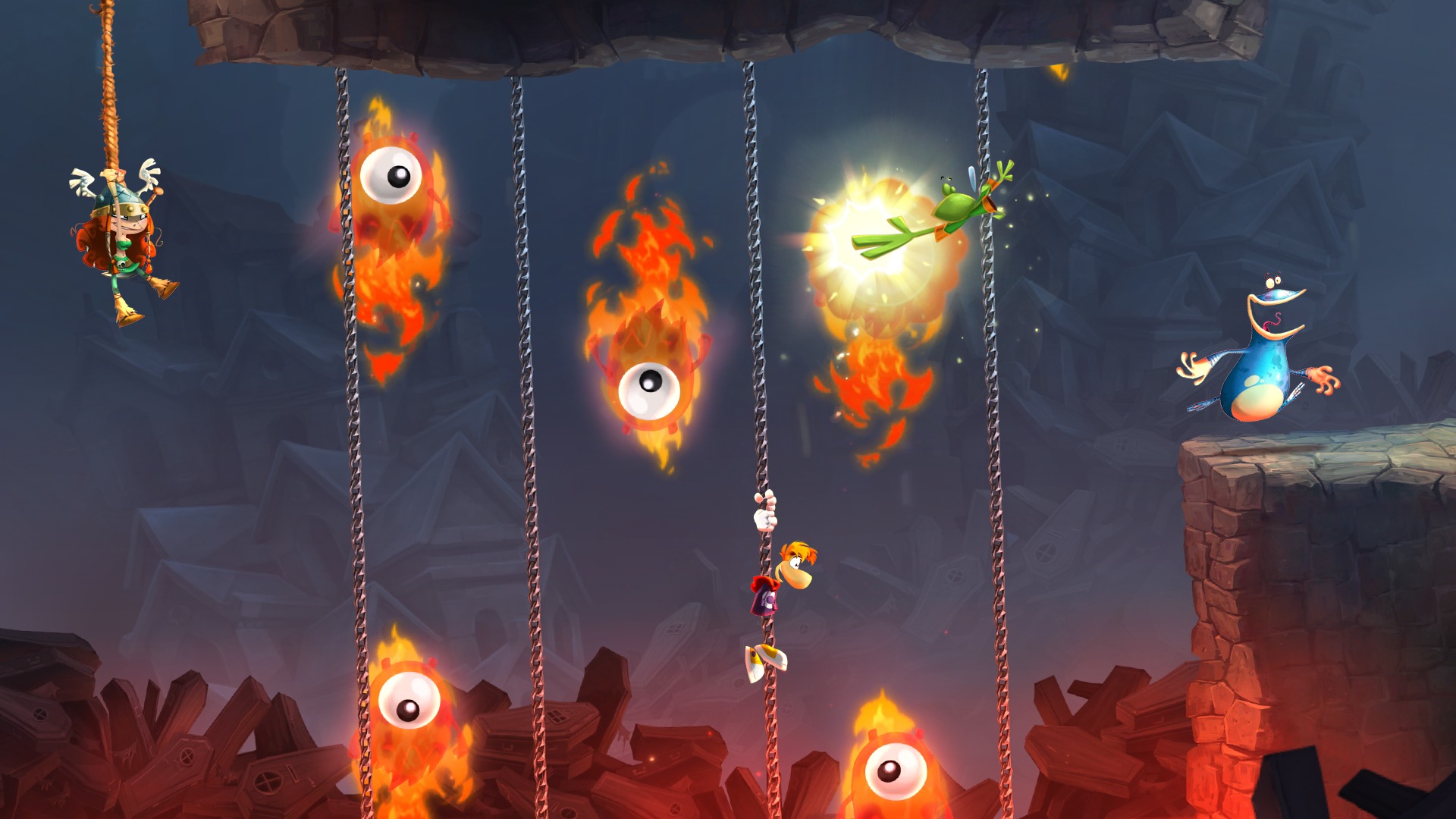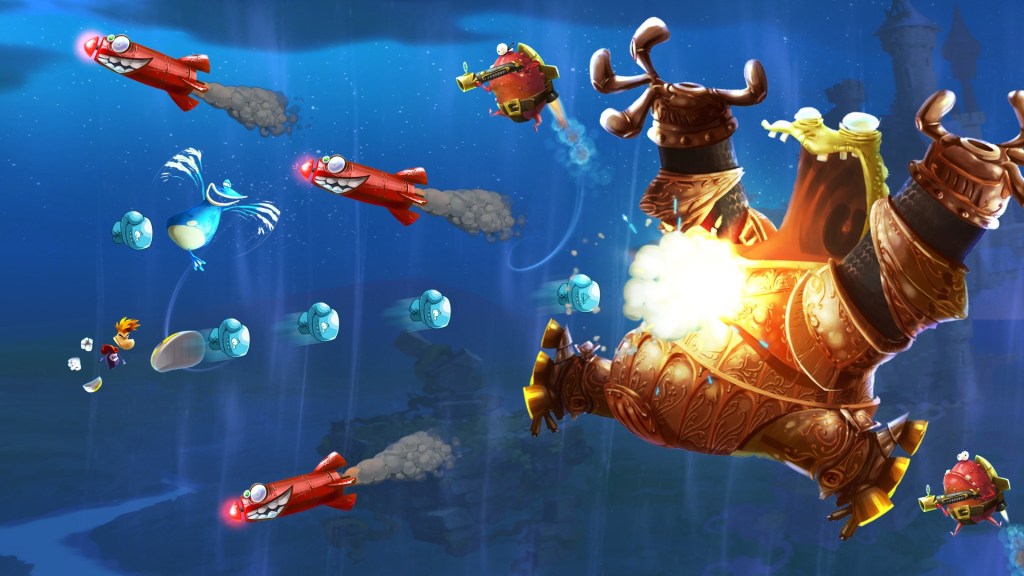Postscript is Cameron Kunzelman’s weekly column about endings, apocalypses, deaths, bosses, and all sorts of other finalities.
I hear a lot of talk about “comfort” games. We live in a time of immense psychic violence, and in my own corner of the world, a lot of the anxiety and anger I feel comes from how much destructive knowledge our various media apparatuses funnel into my head. Social media is a hose of unalloyed negativity. The political machinery of my country is not only breaking down, but the act of it breaking down is joining the implosion tremors of dissolving democracies across the globe. And in that context, people talk about comfort games. I’ve been playing Rayman Legends.
Videos by VICE
Surrounded by the nightmare and with wolves at the door, how does a game deliver comfort? I’m not asking how we know that comfort is happening. I’m asking how we even find comfort games in this context, and what kinds of qualities of comfort game can have. Or, at least, where do I find comfort.
It’s in a little guy named Rayman. He’s a torso surrounded by his head, hands, and feet. He’s disconnected from them, but they still do everything he needs them to, so he doesn’t seem particularly worried about it. He’s a little planet orbited by helpful body parts, and he seems content that way. Or maybe he isn’t. Rayman might have a tragic backstory filled with grimness and grief and howling at the void.
Purposefully, and with singular vision, I don’t know anything about Rayman. I have never looked at a wiki, never read the back of the box, never even stopped to read the occasional dialogue that pops up in Rayman Legends. I don’t want to learn anything about him or his universe. I want to look its its world of collectables and clunky platformer combat as a whirl of abstractions, speed and button presses smashing up against each other in the poetry of level design.

In Rayman Legends, I get comfort out of not being invested. I find solace in not “reading” the game, not looking deeply into it for any length of time. I want to time my wall jumps to make my way through the moving platforms as quickly as possible. I want to know when to hold the run button and when to walk carefully. I want to slam the “interact” button to move platforms out of my way so that I can finish the level at 100% collectables in the shortest time possible. I want to fit all of this into the tiny breaks I have between writing and reading and responsibility.
Chasing comfort this way is monstrous because it turns me into a robot. When I’m playing Rayman Legends, I’m pure inputs and outputs, the black box gamer, only recognizable in its actions and not by any internal workings. Because there aren’t any internal workings. I’m just watching and reacting. I’m forming habits, and every now and again I am stopping to puzzle out where a collectable might be. A metal detector mind in a button pressing body. Pure dissolution.
It’s hard for me to dissociate comfort from habit, the dull repetition of the same over and over again as a way of building a wall against contingency, randomness, and interruption. The steady rhythm of the mattock, the turn of the shovel, the whir of the weed eater as it chews its way through flora and fauna in a wide arc in front of me. The sweltering summer sun and the blunt repetition of work. Looking back to childhood, these were the moments that I could shut everything out and just focus on the task at hand. If you’re not focused, you’ll get hurt; eventually you’re too tired to think about anything else anyway.
And this roboticism of Rayman Legends, my chasing of arbitrary level completion goals without thought and without reflection, is my crude contemporary recreation of the effects of that work. It’s a way of wiping everything out until it’s just me and an implement. We’re doing things. You know us by our actions, like atoms colliding.
There are levels in Rayman Legends that are rhythmic. A song plays in the background, and Rayman runs around in a sidescroller fashion jumping on enemies, collecting objects, and hopping around obstructions in ways that match up to the song. They are novel levels. They are also about inducing habit in a player, helping sublimate the playing agent beneath a song and the actions that go with that song. It’s an elaborate game of Simon Says, and you can lose yourself in it. Immersion, but not like Skyrim. Like drowning.

And when I take a step back from that, when I see how I am using this game as a way of shutting the door on the world, on thought, on contemplating what is happening in the world around me, I’m ambivalent. I’m appreciative of the space, the air gap between my heart and the universe afforded by the game, but I’m also overwhelmed by sadness that I have to do it. That I need Rayman, that little pleasant guy, to help me build a world away from the worst of things. That dissolution is preferable to presence.
I’ll eventually hit some kind of barrier with the game. It will become trite, or something will click with me and I’ll get excited about a game again. I’ll figure out a different way of escaping, a different way of engaging, and I’ll feel energized about the enterprise of living life as a person with thoughts and feelings beyond mere automatic habit. And yet, now, in this context, it’s just me and Rayman.
You can follow Cameron on Twitter.
More
From VICE
-

Getty Images -

Screenshot: IndieArk -

Screenshot: Top Hat Studios, Inc. -

Screenshot: GoldFire Studios/Ocean Drive Studio, Inc.
